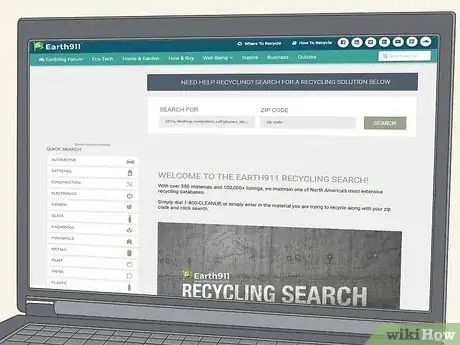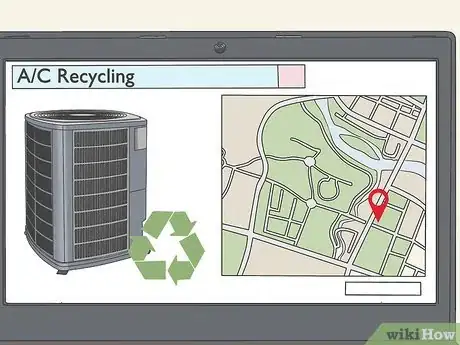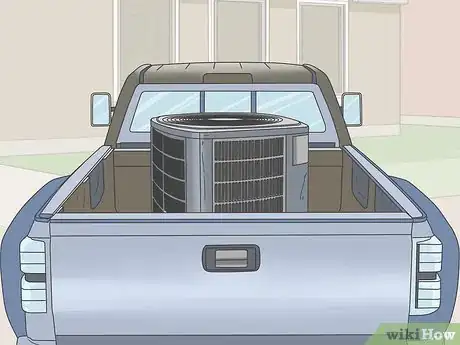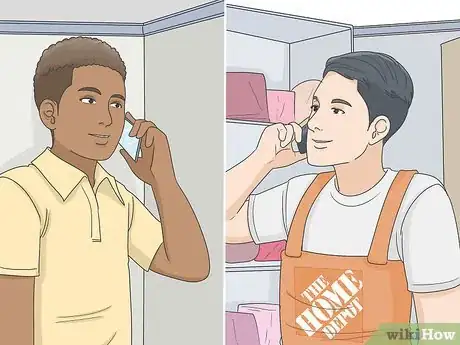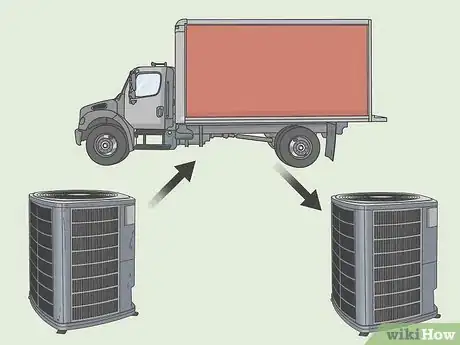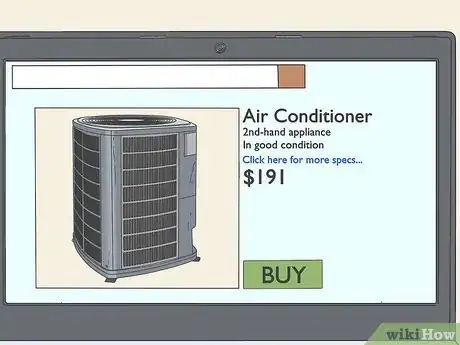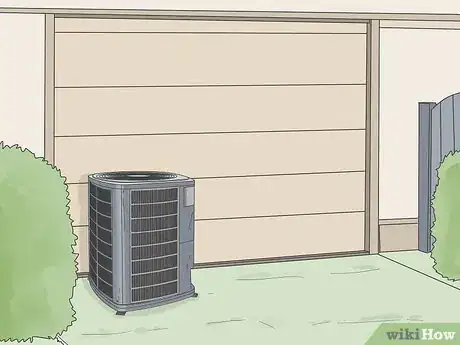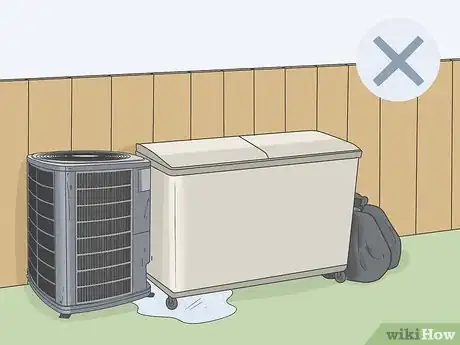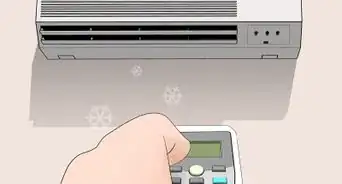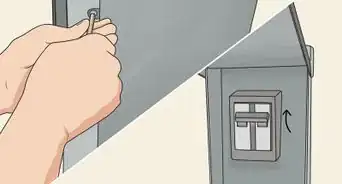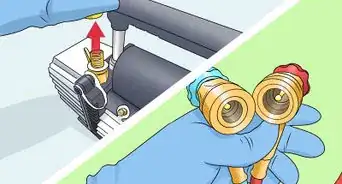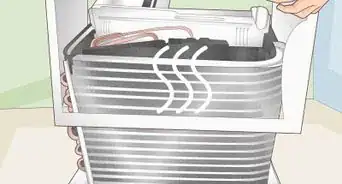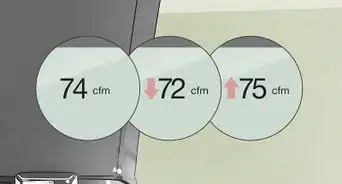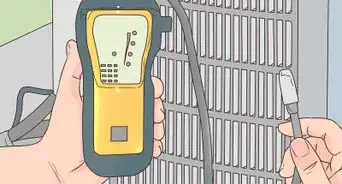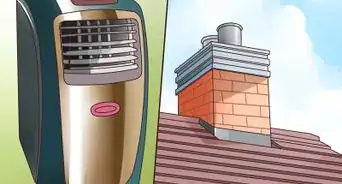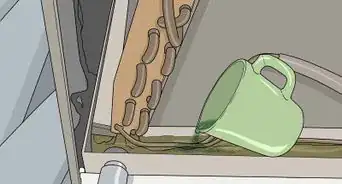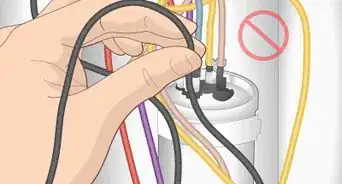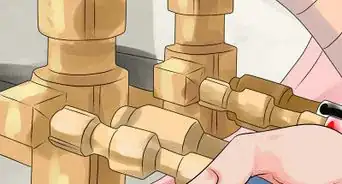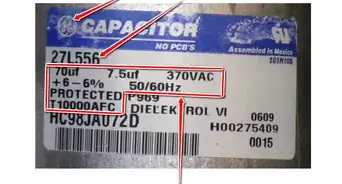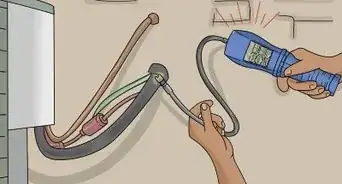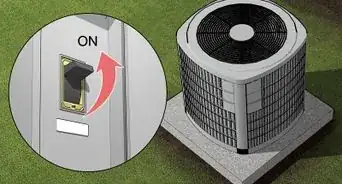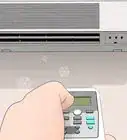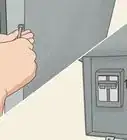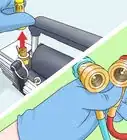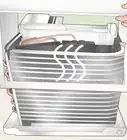This article was co-authored by Victor Belavus and by wikiHow staff writer, Christopher M. Osborne, PhD. Victor Belavus is an Air Conditioning Specialist and the Owner of 212 HVAC, an air condition repair and installation company based in Brooklyn, New York. In addition to HVAC and air conditioning units, Victor also specializes in furnace repair and air duct cleaning. He has over 10 years of experience working with HVAC systems.
This article has been viewed 8,716 times.
Installing and removing a bulky window air conditioner (A/C) unit can be tricky enough—so what do you do when you need to get rid of the thing? Because of the environmentally-unfriendly refrigerant inside, it is illegal nearly everywhere to simply throw out an A/C unit. Instead, in many cases, it’s up to you to find a local recycler that accepts A/Cs. Depending on where you live, you may be eligible for assistance from your local government or utility provider, or you may have to pay for a junk hauler. Whatever you do, don’t dispose of the A/C illegally!
Steps
Finding a Local Recycler Yourself
-
1Navigate to an eco-recycling website that serves your area. In North America, for example, the Earth911 website provides search tools for finding eco-friendly recyclers in your area. Depending on where you live, there may be several other website options available to you.[1]
- You can navigate directly to the Earth911 search page at https://search.earth911.com/?utm_source=earth911-header&utm_medium=top-navigation-menu&utm_campaign=top-nav-recycle-search-button.
- Alternatively, you can conduct an Earth911 search by phone at 1-800-CLEANUP.
-
2Do a web search for A/C recycling and use a wide search area. If given the option, search specifically for A/C recyclers, since not all recyclers are licensed or equipped to handle the refrigerant inside A/C units. Also, if you can search within a set distance of your current location—for example, within 10 or 25 mi (16 or 40 km) of your US ZIP code—you may need to cast a wide net in order to find eligible recyclers.[2]
- If you live in a major metropolitan area, your odds of finding nearby eligible recyclers will likely improve. Otherwise, you may need to be willing to travel possibly 50 mi (80 km) or more.
Advertisement -
3Contact the listed recyclers and choose your best option. Once you identify a few possible options, contact them directly to make sure that they are able and willing to accept A/C units. You can also get info on their hours and any costs or payment associated with your drop-off.[3]
- In some cases, the recycler may pay you for the valuable materials that make up the A/C unit, especially the copper tubing and the refrigerant. Alternatively, you may have to pay a fee to have the unit recycled. It all depends on the market where you live and any subsidies or taxes that may be levied.
-
4Load up the A/C and deliver it to the recycler. While some recyclers may do pick-ups for a fee, it’s typically up to you to take your A/C unit to the recycler. Window A/Cs can easily weigh 50 lb (23 kg) or more, so lift and move the unit carefully, and get help if possible.[4]
- Keep the unit upright while lifting, carrying, and transporting it. Otherwise, the unit may leak coolant, lubricants, or other fluids.
Trying Government, Utility, and Retail Options
-
1Contact your local sanitation provider to see if it handles A/Cs. In some cities, the local sanitation provider may pickup A/C units if you contact it beforehand.[5] If so, you’ll likely be asked to place the unit on the curb (or your typical trash pickup location) on the agreed-upon day. You may also need to apply a special tag to the unit.[6]
- In New York City, for example, you can request this service via online form on the Department of Sanitation website.[7]
- If you don’t have to stick a special tag on the A/C, you may want to add a “Does Not Work” note to the unit so no one else lugs it home in expectation of getting a “free” A/C.
-
2Ask your utility company if it provides rebates and/or pickups. In many cases, local utility providers offer rebates when you switch to more energy-efficient appliances.[8] In addition to a rebate, the utility company may be willing to pick up the old appliance for free, although this is more likely with a refrigerator than a window A/C unit.[9]
- Call your local utility provider or visit its website. If they offer rebates and/or pickups, you’ll probably have to fill out an online form and provide proof that you’ve purchased a more energy-efficient replacement unit.
-
3Call appliance retailers and ask if they recycle old A/Cs. Some appliance retailers—especially large ones—may accept old A/Cs for recycling. This may be the case even if you don’t buy a new A/C from the retailer.[10]
- You’ll probably be responsible for delivering the A/C unit, especially if you’re not buying one from the retailer.
-
4See if you can get old A/C pickup with new A/C delivery. If you do buy a new A/C from a retailer and they offer delivery service, ask whether the delivery crew can take away your old A/C for recycling. This is a more common practice with larger appliances like refrigerators, washers, and dryers, but it’s worth asking in regards to an old window A/C.[11]
- Call the retailer before the delivery date, rather than waiting to ask the delivery crew directly.
Selling, Donating, or Junking Your A/C
-
1Sell or donate an old A/C that still functions. Say, for instance, that your old window A/C still works but you want to upgrade to a more efficient model. In this case, there may still be a market for your functional A/C. Try selling the unit on one or more online seller sites that you trust. Alternatively, donate the A/C to a charitable organization that will in turn sell or donate it.[12]
- When selling appliances or other large items, you’re better off using a seller website that connects you with local buyers. That way, you don’t have to worry about shipping a heavy window A/C.
-
2Pay for a private junk hauler that does A/C recycling. Many junk haulers will take away units that contain refrigerants, such as A/Cs—for a price. Depending on where you live, it may cost in the range of $200 USD to have an A/C unit hauled away for recycling.[13]
- You may get a better deal if you arrange for the hauler to take away a lot of other junk as well.
-
3Think twice before putting your A/C out for scrappers. If residents put their trash out on the curb for pickup where you live, there’s a decent chance that there are people in pickup trucks driving around looking for valuable scrap materials. Since both the refrigerant and the copper in A/C units have value, “scrappers” may be keen to collect your A/C if you put it out. However, there are key negatives to this strategy:[14]
- No one might pick up your A/C, and you may end up having to drag the A/C back to your home. Even worse, you may be cited or fined for putting out an item that isn’t legal for trash pickup.
- You have no idea whether the person who picks up the A/C will recycle it properly. When improperly recycled, A/C refrigerants are particularly bad for the environment.
-
4Do not illegally trash your old A/C. By one estimate, the greenhouse effect of leaked refrigerant from a single window A/C unit is equivalent to taking a 3,000 mi (4,800 km) car trip. Don’t try to sneak your A/C out with your household trash, and definitely don’t dump it over a hillside or in the woods![15]
- You may be stuck without a free or cheap option for getting rid of your old A/C unit. Accept that you have a responsibility to make sure it is disposed of properly.
Expert Q&A
Did you know you can get expert answers for this article?
Unlock expert answers by supporting wikiHow
-
QuestionHow should I get rid of my old AC?
 Victor BelavusVictor Belavus is an Air Conditioning Specialist and the Owner of 212 HVAC, an air condition repair and installation company based in Brooklyn, New York. In addition to HVAC and air conditioning units, Victor also specializes in furnace repair and air duct cleaning. He has over 10 years of experience working with HVAC systems.
Victor BelavusVictor Belavus is an Air Conditioning Specialist and the Owner of 212 HVAC, an air condition repair and installation company based in Brooklyn, New York. In addition to HVAC and air conditioning units, Victor also specializes in furnace repair and air duct cleaning. He has over 10 years of experience working with HVAC systems.
Air Conditioning Specialist
References
- ↑ https://earth911.com/recycling-guide/how-to-recycle-large-appliances/
- ↑ https://earth911.com/recycling-guide/how-to-recycle-large-appliances/
- ↑ https://thewirecutter.com/blog/how-to-dispose-of-a-window-ac-unit/
- ↑ https://thewirecutter.com/blog/how-to-dispose-of-a-window-ac-unit/
- ↑ Victor Belavus. Air Conditioning Specialist. Expert Interview. 4 February 2021.
- ↑ https://thewirecutter.com/blog/how-to-dispose-of-a-window-ac-unit/
- ↑ http://gis.nyc.gov/dsny/cfc/appt/search.htm#
- ↑ Victor Belavus. Air Conditioning Specialist. Expert Interview. 4 February 2021.
- ↑ https://earth911.com/recycling-guide/how-to-recycle-large-appliances/
- ↑ https://thewirecutter.com/blog/how-to-dispose-of-a-window-ac-unit/
- ↑ https://thewirecutter.com/blog/how-to-dispose-of-a-window-ac-unit/
- ↑ https://earth911.com/recycling-guide/how-to-recycle-large-appliances/
- ↑ https://thewirecutter.com/blog/how-to-dispose-of-a-window-ac-unit/
- ↑ https://www.dnainfo.com/chicago/20160830/edgewater/how-do-you-get-rid-of-window-air-conditioner-chicago
- ↑ https://thewirecutter.com/blog/how-to-dispose-of-a-window-ac-unit/
